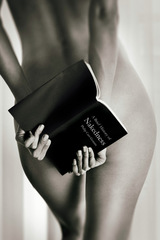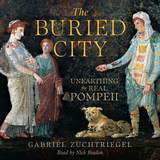8 start with D start with D
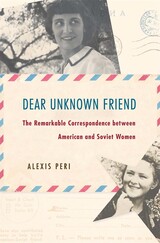
In the tense years of the early Cold War, American and Soviet women conducted a remarkable pen-pal correspondence that enabled them to see each other as friends rather than enemies.
In a compelling new perspective on the early Cold War, prizewinning historian Alexis Peri explores correspondence between American and Soviet women begun in the last years of World War II and continuing into the 1950s. Previously unexamined, the women’s letters movingly demonstrate the power of the personal, as the pen pals engaged in a “diplomacy of the heart” that led them to question why their countries were so divided.
Both Soviet and American women faced a patriarchal backlash after World War II that marginalized them professionally and politically. The pen pals discussed common challenges they faced, such as unequal pay and the difficulties of balancing motherhood with a career. Each side evinced curiosity about the other’s world, asking questions about family and marriage, work conditions, educational opportunities, and religion. The women advocated peace and cooperation but at times disagreed strongly over social and economic issues, such as racial segregation in the United States and mandatory labor in the Soviet Union. At first both governments saw no risk in the communications, as women were presumed to have little influence and no knowledge of state secrets, but eventually Cold War paranoia set in. Amid the Red Scare, the House Un-American Activities Committee even accused some of the American women of being communist agents.
A rare and poignant tale, Dear Unknown Friend offers a glimpse of the Cold War through the perspectives of women who tried to move beyond the label of “enemy” and understand, even befriend, people across increasingly bitter political divides.
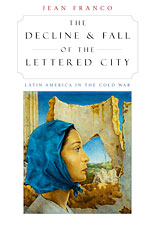
The cultural Cold War in Latin America was waged as a war of values--artistic freedom versus communitarianism, Western values versus national cultures, the autonomy of art versus a commitment to liberation struggles--and at a time when the prestige of literature had never been higher. The projects of the historic avant-garde were revitalized by an anti-capitalist ethos and envisaged as the opposite of the republican state. The Decline and Fall of the Lettered City charts the conflicting universals of this period, the clash between avant-garde and political vanguard. This was also a twilight of literature at the threshold of the great cultural revolution of the seventies and eighties, a revolution to which the Cold War indirectly contributed. In the eighties, civil war and military rule, together with the rapid development of mass culture and communication empires, changed the political and cultural map.
A long-awaited work by an eminent Latin Americanist widely read throughout the world, this book will prove indispensable to anyone hoping to understand Latin American literature and society. Jean Franco guides the reader across minefields of cultural debate and histories of highly polarized struggle. Focusing on literary texts by García Marquez, Vargas Llosa, Roa Bastos, and Juan Carlos Onetti, conducting us through this contested history with the authority of an eyewitness, Franco gives us an engaging overview as involving as it is moving.
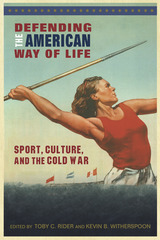
The Cold War was fought in every corner of society, including in the sport and entertainment industries. Recognizing the importance of culture in the battle for hearts and minds, the United States, like the Soviet Union, attempted to win the favor of citizens in nonaligned states through the soft power of sport. Athletes became de facto ambassadors of US interests, their wins and losses serving as emblems of broader efforts to shield American culture—both at home and abroad—against communism.
In Defending the American Way of Life, leading sport historians present new perspectives on high-profile issues in this era of sport history alongside research drawn from previously untapped archival sources to highlight the ways that sports influenced and were influenced by Cold War politics. Surveying the significance of sports in Cold War America through lenses of race, gender, diplomacy, cultural infiltration, anti-communist hysteria, doping, state intervention, and more, this collection illustrates how this conflict remains relevant to US sporting institutions, organizations, and ideologies today.
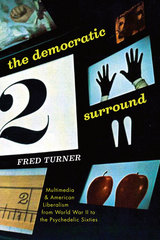
In this prequel to his celebrated book From Counterculture to Cyberculture, Turner rewrites the history of postwar America, showing how in the 1940s and ’50s American liberalism offered a far more radical social vision than we now remember. Turner tracks the influential mid-century entwining of Bauhaus aesthetics with American social science and psychology. From the Museum of Modern Art in New York to the New Bauhaus in Chicago and Black Mountain College in North Carolina, Turner shows how some of the most well-known artists and intellectuals of the forties developed new models of media, new theories of interpersonal and international collaboration, and new visions of an open, tolerant, and democratic self in direct contrast to the repression and conformity associated with the fascist and communist movements. He then shows how their work shaped some of the most significant media events of the Cold War, including Edward Steichen’s Family of Man exhibition, the multimedia performances of John Cage, and, ultimately, the psychedelic Be-Ins of the sixties. Turner demonstrates that by the end of the 1950s this vision of the democratic self and the media built to promote it would actually become part of the mainstream, even shaping American propaganda efforts in Europe.
Overturning common misconceptions of these transformational years, The Democratic Surround shows just how much the artistic and social radicalism of the sixties owed to the liberal ideals of Cold War America, a democratic vision that still underlies our hopes for digital media today.
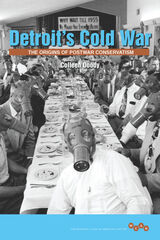
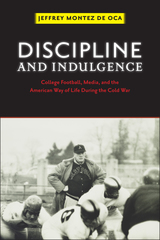
The early Cold War (1947–1964) was a time of optimism in America. Flushed with confidence by the Second World War, many heralded the American Century and saw postwar affluence as proof that capitalism would solve want and poverty. Yet this period also filled people with anxiety. Beyond the specter of nuclear annihilation, the consumerism and affluence of capitalism’s success were seen as turning the sons of pioneers into couch potatoes.
In Discipline and Indulgence, Jeffrey Montez de Oca demonstrates how popular culture, especially college football, addressed capitalism’s contradictions by integrating men into the economy of the Cold War as workers, warriors, and consumers. In the dawning television age, college football provided a ritual and spectacle of the American way of life that anyone could participate in from the comfort of his own home. College football formed an ethical space of patriotic pageantry where men could produce themselves as citizens of the Cold War state. Based on a theoretically sophisticated analysis of Cold War media, Discipline and Indulgence assesses the period’s institutional linkage of sport, higher education, media, and militarism and finds the connections of contemporary sport media to today’s War on Terror.
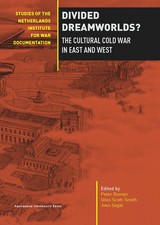
An illuminating and wide-ranging survey of interrelated collective dreams from both sides of the Iron Curtain, Divided Dreamworlds? has a place on the bookshelf of any modern historian.
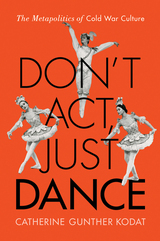
READERS
Browse our collection.
PUBLISHERS
See BiblioVault's publisher services.
STUDENT SERVICES
Files for college accessibility offices.
UChicago Accessibility Resources
home | accessibility | search | about | contact us
BiblioVault ® 2001 - 2025
The University of Chicago Press


